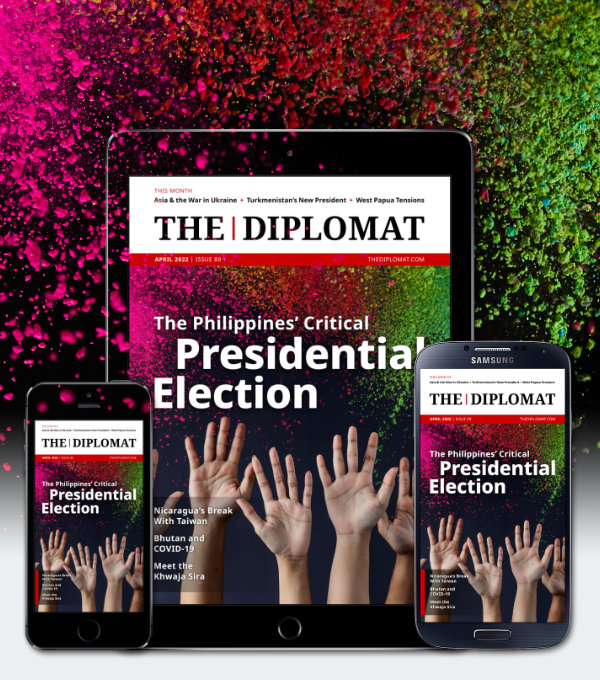| Welcome to the latest issue of Diplomat Brief. This week our top story examines the oddity of local elections under the Taliban. We also have an interview with Bhavani Fonseka, a senior researcher at the Centre for Policy Alternatives in Colombo, about the ongoing protests in Sri Lanka. |
| Story of the week |  | POLITICS The Peculiar Case of Elections Under the TalibanWhat Happened: In March 2022, something peculiar happened in several neighborhoods in Kabul: Afghans, including women, gathered to elect their wakilon guzar, or neighborhood representative, casting their votes in ballot boxes or by raising their hands in gatherings in mosques. These elections, which passed without fanfare, represented a curious contradiction for the Taliban, who have long dismissed elections and democracy as “un-Islamic.” Our Focus: Residents in one neighborhood described gathering in a local mosque to elect their representative – who was running unopposed – by a show of hands. Locals told The Diplomat they had requested the election before the Taliban overran Afghanistan in summer 2021; shortly after that, the Taliban approved the existing regulations for elections of neighborhood representatives with only “minor changes,” according to a Kabul official. That led to the surprising circumstances of a democratic election held under Taliban rule – a first for Afghanistan. What Comes Next: Analysts warn that we shouldn’t read too much into the polls. For one thing, they apparently were limited to Kabul, not replicated in other cities; for another, neighborhood representatives act only as liaisons with the government and have no lawmaking power. “For now, the Taliban are completely opposed to having an election-based Emirate,” Ibraheem Bahiss, a consultant working on Afghanistan for the International Crisis Group, told The Diplomat. “As elections are such an anathema to what the Taliban stand for, they would not hold municipality-elections without purpose.” It may suggest that the Taliban are open to elections for lower-level, local positions – particularly in urban areas. But for now, the polls remain a curious footnote in the Taliban’s governance history. Read this story |
| Behind the News | INTERVIEW Bhavani FonsekaBhavani Fonseka, a human rights lawyer and senior researcher at the Centre for Policy Alternatives, about the protests in Sri Lanka and the potential for political reform: “The present call to abolish the executive presidency comes at an opportune moment when thousands have witnessed and experienced the dangers the office holds and the devastation it can cause in different spheres, with implications for Sri Lanka’s stability and economy.” Read the interview |
| This Week in Asia | Northeast Asia Will Beijing Follow Shanghai Into Lockdown?As Shanghai’s city-wide lockdown nears the one-month mark for many residents, worries are growing that Beijing may be facing a similar situation. Orders for mandatory city-wide testing could presage a major outbreak that would force China’s capital to lock down. Certain neighborhoods in Beijing have already ordered residents to stay in their homes. If the situation escalates, hopefully local officials have learned from the mistakes that left many Shanghai residents scrambling to secure supplies of food and medicines during the past month. Find out more | South Asia Pakistan’s New Government Struggles to GovernIn Pakistan, new Prime Minister Shehbaz Sharif has his hands full. Not only does he have to face a looming economic crisis, but he must do so while recently ousted Prime Minister Imran Khan draws crowds of thousands with claims that Sharif’s government is illegitimate, the result of a U.S. conspiracy. Khan is urging his supporters not to obey edicts from the new government. As if that weren’t enough, a recent suicide bombing targeting Chinese nationals is sure to up the pressure on Sharif to deal with rising terrorism in Pakistan. Find out more | Southeast Asia Japanese PM Bound for Southeast AsiaJapan’s Prime Minister Kishida Fumio will this week embark on a regional tour of Southeast Asia that will take him to Indonesia, Thailand, and Vietnam. The purpose of the trip, Kishida’s first to Southeast Asia since taking office in October, is to garner regional support for stronger sanctions against Russia in the wake of its invasion of Ukraine. He will also seek to shore up key Japanese partnerships amid China’s continuing assertiveness in the East and South China seas, a few weeks after Japan and the Philippines agreed to bolster bilateral security cooperation and expand joint military drills. Find out more | Central Asia Is a New Kyrgyzstan-U.S. Bilateral Cooperation Agreement Near?Back in 2015, after the U.S. State Department named a jailed Kyrgyz-Uzbek activist for a human rights defender award, Bishkek scrapped its 1993 cooperation treaty with Washington. Fast forward seven years and Kyrgyzstan’s human rights record hasn’t improved (the activist died in jail in 2020), but its economy sure could use greater cooperation and aid from the United States. Maybe a new BCA is in the cards? Find out more |
| Visualizing APAC |  | The U.S. Commission on International Religious Freedom’s latest report accused 27 countries – including 13 in the Asia-Pacific – of “severe” violations of religious freedom. See the full picture |
| Word of the Week | POLITICS LugawRice porridge in Filipino. The word became a derogatory term used by some to dismiss presidential candidate Leni Robredo after she served the dish in her campaign events, suggesting that like the rice porridge, she is of little substance. Robredo and her supporters embraced the attack and started serving lugaw across the nation. Find out more |
|  |





